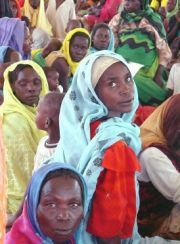UN refugee chief bemoans paltry funding after Darfur tour
CAIRO, April 21 (AFP) — The acting UN High Commissioner for Refugees predicted a bleak future for millions of civilians uprooted from homes in Sudan’s Darfur region and called for an immediate rise in international aid.

|
|
Sudanese women and children sit in front of a tent on the sand in the Kalma camp for internally displaced persons on the outskirts of the southern Darfur town of Nyala. (AFP) . |
“There is a large population which is entirely dependent on the international community for food, yet I don’t see international funding coming,” Wendy Chamberlin said.
“The Sudanese government is trying very hard to encourage people to return to their homes, but I haven’t spoken to anybody who thought it was safe enough,” she told AFP after a visit to Sudan.
There are close to 200,000 Darfur refugees in neighbouring Chad but the UNHCR is also providing key assistance to more than two million people who have been internally displaced since the conflict erupted more than two years ago.
Chamberlin said that so far the UNHCR had received just two million dollars of the 30 million needed for the rest of the year.
“Appeals are simply not being answered … I don’t see a short-term solution for Darfur.”
The World Food Programme warned Wednesday of a food shortage due to the funding shortfall and announced it would for the first time halve non-cereal rations in Darfur.
Due to “a drastic shortage of funds, the WFP will have to cut by half the non-cereal part of the daily ration for more than a million people, starting from May,” the UN agency’s spokeswoman Penny Ferguson told reporters.
The United Nations has described Darfur as the world’s worst current humanitarian crisis.
Relief agencies say that killings and rapes are still taking place in Darfur, a region the size of France where a small contingent of African Union monitors has struggled to restore security.
According to some estimates, as many as 300,000 people have died in Darfur since an ethnic minority uprising in early 2003 sparked a savage crackdown by the Arab-dominated government.
Earlier this month, the UN Security Council referred a raft of government and security officials to the International Criminal Court in The Hague for prosecution for war crimes after a UN inquiry found evidence of gross human rights violations.
However US Deputy Secretary of State Robert Zoellick said after a visit to Khartoum last week that the Darfur peace process was finally “moving forward”.
